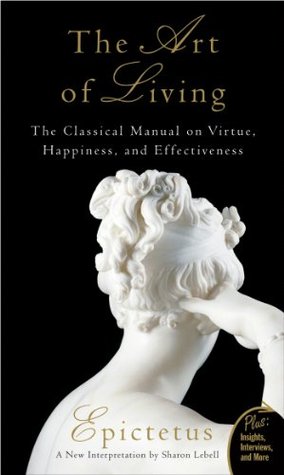More on this book
Community
Kindle Notes & Highlights
by
Epictetus
Read between
August 20 - August 22, 2023
His prescription for the good life centered on three main themes: mastering your desires, performing your duties, and learning to think clearly about yourself and your relations within the larger community of humanity.
Happiness and freedom begin with a clear understanding of one principle: Some things are within our control, and some things are not.
Keep your attention focused entirely on what is truly your own concern, and be clear that what belongs to others is their business and none of yours.
Do your best to rein in your desire. For if you desire something that isn’t within your own control, disappointment will surely follow; meanwhile, you will be neglecting the very things that are within your control that are worthy of desire.
When something happens, the only thing in your power is your attitude toward it; you can either accept it or resent it.
Things and people are not what we wish them to be nor what they seem to be. They are what they are.
Don’t demand or expect that events happen as you would wish them to. Accept events as they actually happen. That way peace is possible.
The important thing is to take great care with what you have while the world lets you have it, just as a traveler takes care of a room at an inn.
Still, if you find yourself in conversation with someone who is depressed, hurt, or frustrated, show them kindness and give them a sympathetic ear; just don’t allow yourself to be pulled down too.
Your happiness depends on three things, all of which are within your power: your will, your ideas concerning the events in which you are involved, and the use you make of your ideas.
Stop aspiring to be anyone other than your own best self: for that does fall within your control.
What is a good person? The one who achieves tranquility by having formed the habit of asking on every occasion, “What is the right thing to do now?”
First and foremost, think before you speak to make sure you are speaking with good purpose. Glib talk disrespects others. Breezy self-disclosure disrespects yourself. So many people feel compelled to give voice to any passing feeling, thought, or impression they have. They randomly dump the contents of their minds without regard to the consequences. This is practically and morally dangerous. If we babble about every idea that occurs to us—big and small—we can easily fritter away in the trivial currents of mindless talk ideas that have true merit. Unchecked speech is like a vehicle wildly
...more
Just because some people are nice to you doesn’t mean you should spend time with them. Just because they seek you out and are interested in you or your affairs doesn’t mean you should associate with them. Be selective about whom you take on as friends, colleagues, and neighbors. All of these people can affect your destiny. The world is full of agreeable and talented folk.
Regularly ask yourself, “How are my thoughts, words, and deeds affecting my friends, my spouse, my neighbor, my child, my employer, my subordinates, my fellow citizens? Am I doing my part to contribute to the spiritual progress of all with whom I come in contact?” Make it your business to draw out the best in others by being an exemplar yourself.
The morally trained, rather than resenting or dodging their current life situations and duties, give thanks for them and fully immerse themselves in their duties to their family, friends, neighbors, and job. When we succumb to whining, we diminish our possibilities.
Goodness exists independently of our conception of it. The good is out there and it always has been out there, even before we began to exist.
Don’t just say you have read books. Show that through them you have learned to think better, to be a more discriminating and reflective person. Books are the training weights of the mind. They are very helpful, but it would be a bad mistake to suppose that one has made progress simply by having internalized their contents.
Forgive others for their misdeeds over and over again. This gesture fosters inner ease. Forgive yourself over and over and over again. Then try to do better next time.
Practice having a grateful attitude and you will be happy. If you take a broad view of what befalls each person and appreciate the usefulness of things that happen, it is natural to give thanks to the Ultimate for everything that happens in the world.


